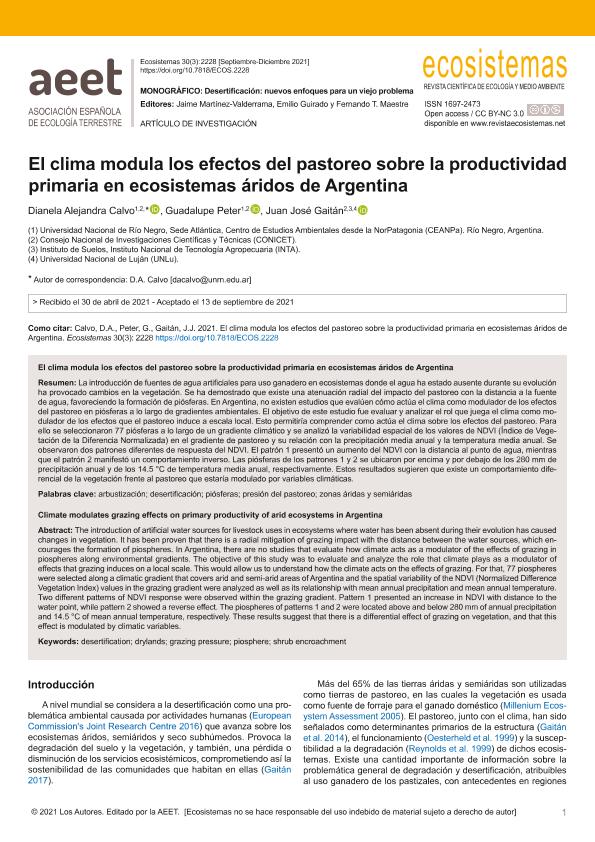Mostrar el registro sencillo del ítem
dc.contributor.author
Calvo, Dianela Alejandra

dc.contributor.author
Peter, Guadalupe

dc.contributor.author
Gaitán, Juan José

dc.date.available
2022-07-18T13:13:21Z
dc.date.issued
2021-12
dc.identifier.citation
Calvo, Dianela Alejandra; Peter, Guadalupe; Gaitán, Juan José; El clima modula los efectos del pastoreo sobre la productividad primaria en ecosistemas áridos de Argentina; Asociación Española de Ecología Terrestre; Ecosistemas; 30; 3; 12-2021; 1-10
dc.identifier.uri
http://hdl.handle.net/11336/162313
dc.description.abstract
La introducción de fuentes de agua artificiales para uso ganadero en ecosistemas donde el agua ha estado ausente durante su evolución ha provocado cambios en la vegetación. Se ha demostrado que existe una atenuación radial del impacto del pastoreo con la distancia a la fuente de agua, favoreciendo la formación de piósferas. En Argentina, no existen estudios que evalúen cómo actúa el clima como modulador de los efectos del pastoreo en piósferas a lo largo de gradientes ambientales. El objetivo de este estudio fue evaluar y analizar el rol que juega el clima como modulador de los efectos que el pastoreo induce a escala local. Esto permitiría comprender como actúa el clima sobre los efectos del pastoreo. Para ello se seleccionaron 77 piósferas a lo largo de un gradiente climático y se analizó la variabilidad espacial de los valores de NDVI (Índice de Vegetación de la Diferencia Normalizada) en el gradiente de pastoreo y su relación con la precipitación media anual y la temperatura media anual. Se observaron dos patrones diferentes de respuesta del NDVI. El patrón 1 presentó un aumento del NDVI con la distancia al punto de agua, mientras que el patrón 2 manifestó un comportamiento inverso. Las piósferas de los patrones 1 y 2 se ubicaron por encima y por debajo de los 280 mm de precipitación anual y de los 14.5 °C de temperatura media anual, respectivamente. Estos resultados sugieren que existe un comportamiento diferencial de la vegetación frente al pastoreo que estaría modulado por variables climáticas.
dc.description.abstract
The introduction of artificial water sources for livestock uses in ecosystems where water has been absent during their evolution has caused changes in vegetation. It has been proven that there is a radial mitigation of grazing impact with the distance between the water sources, which encourages the formation of piospheres. In Argentina, there are no studies that evaluate how climate acts as a modulator of the effects of grazing in piospheres along environmental gradients. The objective of this study was to evaluate and analyze the role that climate plays as a modulator of effects that grazing induces on a local scale. This would allow us to understand how the climate acts on the effects of grazing. For that, 77 piospheres were selected along a climatic gradient that covers arid and semi-arid areas of Argentina and the spatial variability of the NDVI (Normalized Difference Vegetation Index) values in the grazing gradient were analyzed as well as its relationship with mean annual precipitation and mean annual temperature. Two different patterns of NDVI response were observed within the grazing gradient. Pattern 1 presented an increase in NDVI with distance to the water point, while pattern 2 showed a reverse effect. The piospheres of patterns 1 and 2 were located above and below 280 mm of annual precipitation and 14.5 °C of mean annual temperature, respectively. These results suggest that there is a differential effect of grazing on vegetation, and that this effect is modulated by climatic variables.
dc.format
application/pdf
dc.language.iso
spa
dc.publisher
Asociación Española de Ecología Terrestre
dc.rights
info:eu-repo/semantics/openAccess
dc.rights.uri
https://creativecommons.org/licenses/by-nc/2.5/ar/
dc.subject
ARBUSTIZACIÓN
dc.subject
DESERTIFICACIÓN
dc.subject
PIÓSFERAS
dc.subject
PRESIÓN DEL PASTOREO
dc.subject
ZONAS ÁRIDAS
dc.subject
ZONAS SEMIÁRIDAS
dc.subject.classification
Conservación de la Biodiversidad

dc.subject.classification
Ciencias Biológicas

dc.subject.classification
CIENCIAS NATURALES Y EXACTAS

dc.title
El clima modula los efectos del pastoreo sobre la productividad primaria en ecosistemas áridos de Argentina
dc.title
Climate modulates grazing effects on primary productivity of arid ecosystems in Argentina
dc.type
info:eu-repo/semantics/article
dc.type
info:ar-repo/semantics/artículo
dc.type
info:eu-repo/semantics/publishedVersion
dc.date.updated
2022-07-15T14:49:22Z
dc.identifier.eissn
1697-2473
dc.journal.volume
30
dc.journal.number
3
dc.journal.pagination
1-10
dc.journal.pais
España

dc.journal.ciudad
Madrid
dc.description.fil
Fil: Calvo, Dianela Alejandra. Consejo Nacional de Investigaciones Científicas y Técnicas. Centro Científico Tecnológico Conicet - Patagonia Confluencia; Argentina. Universidad Nacional de Río Negro. Sede Atlántica. Centro de Estudios Ambientales desde la Norpatagonia; Argentina
dc.description.fil
Fil: Peter, Guadalupe. Consejo Nacional de Investigaciones Científicas y Técnicas. Centro Científico Tecnológico Conicet - Patagonia Confluencia; Argentina. Universidad Nacional de Rio Negro. Sede Atlantica. Centro de Estudios Ambientales Desde la Norpatagonia.; Argentina
dc.description.fil
Fil: Gaitán, Juan José. Consejo Nacional de Investigaciones Científicas y Técnicas; Argentina. Instituto Nacional de Tecnología Agropecuaria. Centro de Investigación de Recursos Naturales. Instituto de Suelos; Argentina. Universidad Nacional de Luján; Argentina
dc.journal.title
Ecosistemas
dc.relation.alternativeid
info:eu-repo/semantics/altIdentifier/url/https://revistaecosistemas.net/index.php/ecosistemas/article/view/2228
dc.relation.alternativeid
info:eu-repo/semantics/altIdentifier/doi/http://dx.doi.org/10.7818/ECOS.2228
Archivos asociados
